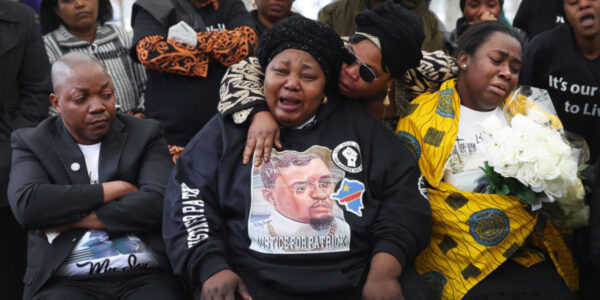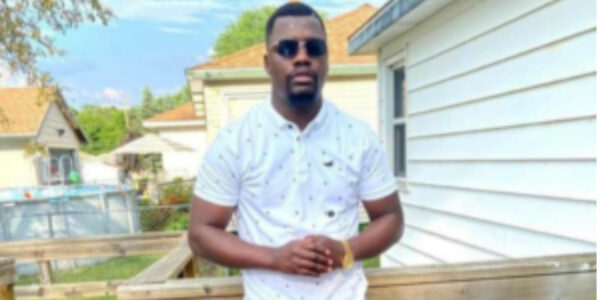The family of Patrick Lyoya, a Black man fatally shot in the back of the head in April during a traffic stop, has filed a $100 million federal lawsuit against Grand Rapids, Michigan, and the now former cop.
Attorneys for the family say the cop violated the victim’s civil rights during the fatal encounter. They are seeking nine figures, not to place value on the deceased’s life, but to force the city to seriously look at police-involved violence against people of color.

Civil rights lawyer Ben Crump, who is part of the legal team representing Peter Lyoya and his son’s estate, said there were two major factors at play: race and abuse of authority.
“Repeatedly these traffic stops end up deadly for Black people … so his son’s life won’t be in vain, but more importantly we want it to be a deterrent for the next officer who pulls a Black motorist,” said Crump, at a Dec. 7 news conference.
The family is seeking $100 million, including compensatory and punitive damages, according to Crump.
“When you take driving while Black plus excessive force, you end up with Patrick Lyoya being unjustly executed by this Grand Rapids police officer,” Crump told reporters.
The lawsuit obtained by Atlanta Black Star alleges that Christopher Schurr used excessive force during his altercation with the 26-year-old on April 4.
Lyoya was driving a tan 2003 Nissan Altima through a residential neighborhood with his friend around 8 a.m. when Schurr spotted him.
Schurr, 31, who was driving the opposite way, turned on his emergency lights and signaled for the Black man to pull the car over. After complying, Lyoya exited his vehicle without instruction, and the officer yelled at him to get back into the car.
Schurr told Lyoya the license plate did not match the registration on the car. The man asked his friend on the passenger side to retrieve his license to give to the officer, the lawsuit says.
“Then, Patrick shut the driver’s door and began walking toward the front end of his car. As soon as Patrick moved, Schurr grabbed Patrick with both hands from behind and told him to put his hands behind his back,” the complaint continued. “Patrick turned and began to run away from Schurr toward an adjacent yard. Schurr radioed ‘got one running’ and chased after Patrick on foot.”
The two wrestled. However, the officer maintained the upper hand, the lawsuit says. He “grabbed, kicked, punched, slapped, and kneed Patrick to the ground.”
After a series of knockdowns, “Schurr grabbed Patrick’s sweater up with his left hand, while he drew and aimed his Taser at him with his right.” The lawsuit argues this was contrary to Schurr’s training, which required the officer to give “Patrick a verbal warning before he deployed the Taser.”
The young Congolese immigrant, out of reflex, tried to “deflect” the Taser’s barrel, causing it to miss him. Another Taser shot was fired, which also did not strike Lyoya. However, Lyoya lost his balance, the filing states, and fell to the ground.
“Schurr knew Patrick wasn’t armed. But that didn’t stop him from holding Patrick down, grabbing his gun, pressing it along the base of his skull, and killing him with one shot to the back of the head,” the complaint says.
Four videos were released to the public showing the struggle between Lyoya and Schurr. The footage, including Schurr’s patrol car’s dash cam and cellphone video from a witness, shows that Lyoya looked like he was trying to take the officer’s Taser but was restrained by the cop with a knee to his back before being shot in his head.
The lawyers argued Lyoya’s death was caused by the officer’s use of excessive force, particularly since he had no reason to pull him over. The lawsuit claims Schurr could not have seen the license plates because Lyoya’s vehicle was coming from the opposite direction.
It accuses Schurr of being “grossly negligent” during the encounter. Schurr breached his duties to Lyoya when he failed to de-escalate the commotion, the lawsuit alleges. In addition, he violated his civil rights when he did not wait for backup or create sufficient space before deploying each Taser probe. Schurr also failed to warn Lyoya of his intent to use force before he deployed his Taser or before he fired his gun.
The lawsuit also points out the officer did not attempt other methods “of detainment, arrest, and/or apprehension, short of force.”
Neither the city of Grand Rapids nor Matthew Borgula, an attorney for Schurr, had any comments regarding the case, according to NBC News. However, representatives for the city said: “Upon receipt, we will review the lawsuit and respond appropriately in court.”
